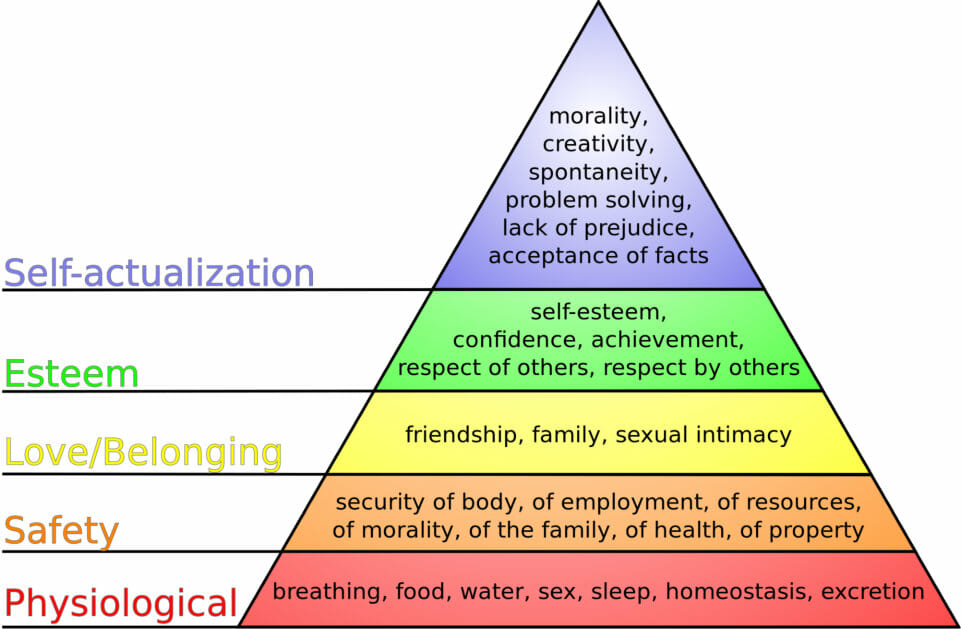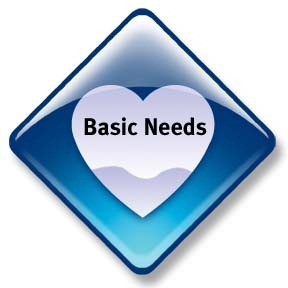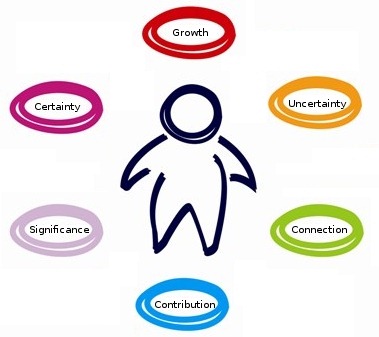
If we want to understand ourselves and others, it is not enough to know what is important to us. We also have to understand our six human needs, also know as “6 emotional needs”.
Needs are beliefs that we have to have something, or that there is something we cannot live without.
Regardless of whether it is true or not, we function in life based on this belief. Needs are different from desires because they come with a small sense of panic and pressure.
The reason it is very important to identify our own and other’s needs is that needs are subconscious. They control our behavior and will override everything we value.
Maslow’s Hierarchy of Needs
Abraham Maslow presented the basic human needs as a hierarchy that we gradually fulfill as we evolve and develop. We must satisfy our basic needs and only then can we focus on other things.

Anthony Robbins separated the psychological areas from the physical and reworked them into 6 emotional needs.
All people have 6 basic emotional needs that they will do anything to get. Even if it is not good for us, is not healthy, is going to get us into trouble or might ruin our lives, a need is something we think we have to have. That is why it is a need – it gives us a small panic attack about losing something we think we cannot live without.
The Top Six Human Needs
The six human needs are:
- Certainty – A sense of security, safety and comfort in the world
- Variety – A sense of change, interest and adventure
- Significance – A sense of uniqueness, individuality and being special
- Love & Connection – A sense of acceptance, belonging and support
- Growth – A desire to learn, grow and evolve
- Contribution – The desire to give to those around us
The six human needs work in pairs – certainty and variety, significance with love & connection, growth and contribution. The first two pairs are in constant search for balance. The last two, growth and contribution, can live happily with each other, each growing with the other.

Another way to think of it as like the search for a radio station. If you move the knob too much to the right or too much to the left, you hear static noises. Only when you turn it to the exact right place, you can hear music. Fulfilling our six human needs is like finding our own music station.
Certainty
Of the 6 human needs, certainty is one of the most basic ones that are critical for our survival. It is a search for security and comfort in the world around us. Routine and structure give us a lot of certainty. They give us a feeling that we know what is going to happen tomorrow. It is very healthy for our peace of mind.
If this need is not met, your brain will be directing you to do anything you can to meet this need. In life, our successes are partially determined by our ability to withstand not having certainty in a situation.
Think about it this way: being a successful investor, means you need to manage not being certain about the fluctuations in the market.

Different people use a lot of different methods to get certainty in their lives. Creating routines, planning ahead and being very organized are great ways to bring certainty. There are some other, not so great ways to deal with uncertainty, such as overeating and biting your nails.
More Common Examples of Certainty
Cleaning and organizing – This is a healthy way to bring certainly into your life. This way you can make sure you find everything you need as quickly as possible.
Controlling – Some people get certainty by trying to control everything around them, so that they do not feel overwhelmed. People who love to be in control are simply trying to get their needs met in the only way they know how.
Having a routine – Some people get certainty by doing the same thing day after day. This can be a very healthy and easy method to bring certainty. However, this can be a challenge if we start to depend on this routine so much that everything out of the ordinary freaks us out.

Money does bring certainty. However, from a certain amount it has no effect on certainty. Sometimes with a lot of money, you get a whole heap of new uncertainties to deal with!
Labeling – This is another method to understand the world around us. Some people give a name to everything around them, to their thoughts, feelings, and problems. They do it to chunk down. To minimize the feeling of overwhelm.
This is a great way to manage. The only problem with this is that it limits the range of the experiences we feel. Many of my clients have challenges because they chunked down the feeling of happiness so much, they can hardly feel it.
Negative labeling – Some people get certainty by negatively labeling themselves. They often do it if they do not know what is happening to them and they feel uncertain about something.
For instance, if they keep avoiding doing something, rather than risk the uncertainty of not knowing why they keep avoiding it, they simply label themselves: “Oh, that’s just me. I’m a procrastinator!”

Being in a relationship – Stable relationships are very good for creating certainty. Research has found that people in stable and long-term relationships are healthier, happier and live longer.
Once again, the problem with relying on relationships for certainty is that in the long-term, they can also be a source of uncertainty.
And what happens when you get totally certain? When you know exactly what will happen, when it will happen and nothing is a surprise to you anymore?
BOREDOM!
Having too much certainty will trigger the need for change, for surprise or diversification – some variety.

Want to know more about the six human needs? Join me next time when I explain what happens when we have too much certainty and in order to balance it, how we try to increase variety our lives.
Be happy,
Ronit











